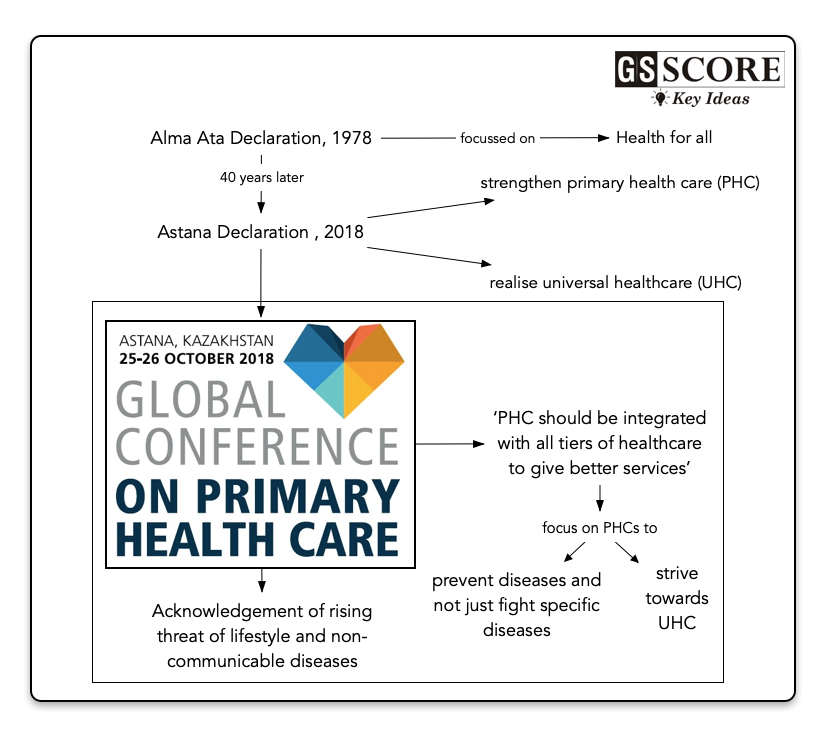

In an event that marked 40 years of the historic Alma Ata Declaration, which declared health a human right for all, all the 192 member countries of the United Nations, including India, signed the Astana Declaration.
Context
In an event that marked 40 years of the historic Alma Ata Declaration, which declared health a human right for all, all the 192 member countries of the United Nations, including India, signed the Astana Declaration.
About
Aim: This declaration is meant to take the earlier agreement forward, strengthen the primary healthcare (PHC) systems and realise the idea of universal healthcare (UHC).
Key takeaways from the declaration:
- The declaration touches upon the crucial aspect that PHC should not function in vacuum and there has to be cohesion between all tiers of healthcare so that the services given to patients are not limited.
- The declaration also takes into cognizance the growing threat of lifestyle and non-communicable diseases.
- The declaration asks all member states to make “bold political choices” for health across sectors.
- It also seeks a multi-sectoral action that includes technology, scientific and traditional knowledge, along with well-trained and compensated health professionals, and people and community participation is needed to strengthen primary health care and provide quality “health for all”
Significance
Need for this declaration
- Health not available to all: Forty years on, almost half the world’s population lacks access to essential health services, and 100 million people are pushed into poverty because of catastrophic health expenditure each year. Primary health care can provide 80-90% of a person’s healthcare needs in their lifetime.
- Growing cost of healthcare machinery: While the Alma Ata declaration talked about availability of healthcare for one and all, the Astana declaration goes a step ahead and expresses concern about growing cost of healthcare machinery.
- Lack of commitment to prevent disease: We have been too focused on fighting specific disease, too focussed on treatment at the expense of preventing diseases. We must recommit to making primary health care as the foundation of universal healthcare.
- Although, the world is a healthier place for children today than ever before, close to 6 million children die every year before their fifth birthday mostly from preventable causes, and more than 150 million are stunted.
Benefit:
The new declaration will renew political commitment to primary health care from governments, non-governmental organisations, professional organisations, academia and global health and development organisations.
Way forward emphasized by the declaration:
- Millions needs to be saved from poverty, particularly extreme poverty, caused by disproportionate out-of-pocket expenses on health.
- The crucial importance of health promotion and disease prevention should no longer be under-emphasize, nor fragmented, unsafe or poor-quality care should be tolerated.
- The shortage and uneven distribution of health workers and the growing costs of medicines and vaccines must be addressed.
- Any waste in healthcare spending due to inefficiency cannot be afforded.
- Efforts should be strived to avoid fragmentation and ensure a functional referral system between primary and other levels of care.
Learning Aid



